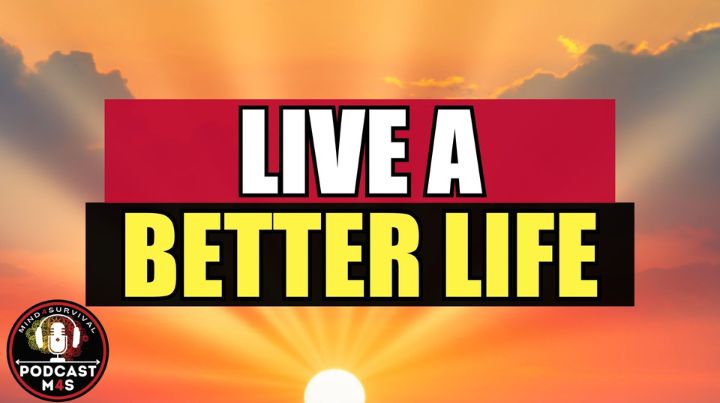Live a Better Life! The Secrets of Grace and Empathy

In the world of preparedness, we often focus on the tangible—stockpiles, gear, and survival strategies. But what about the intangible qualities that can improve life, even in the most challenging times? That's where grace and empathy come into play. When we actively pursue these virtues, they enhance our resilience and strengthen our relationships, making them an invaluable addition to everyone's mental toolkit.
The Essence of Grace and Empathy
Grace is that quiet strength that allows us to navigate life's storms with a sense of calm and dignity. It's about treating ourselves and others with kindness and forgiveness, even when it's the hardest thing to do.
Empathy, on the other hand, is our ability to understand and share the feelings of others. Empathy helps us understand another person's why. That doesn't mean we must agree with their beliefs, but it gives us a starting point for understanding. You can think of empathy as an excellent situational awareness tool that helps you understand the foundation of a person's beliefs. In short, empathy is the bridge that connects us, human to human.
Together, grace and empathy form the backbone of our interactions with others, which can withstand natural disasters and the everyday challenges that life throws our way. They help us see beyond ourselves and our immediate needs, fostering understanding, unity, and compassion.
The Role of Grace in Personal Growth
In the preparedness community, we're no strangers to adversity. Whether it's a natural disaster or a bad day, how we respond to life's challenges can define our path forward. Grace helps us to meet our challenges head-on without losing our cool or compassion. It helps us to understand that bad things happen and that we sometimes screw things up, and that's okay because it's part of the human condition.
Embracing Self-Compassion
One of the first steps to living with grace is practicing self-compassion. It's about acknowledging our mistakes and flaws without self-judgment. This isn't about making excuses but giving ourselves the understanding and kindness we'd extend to a good friend in the same situation. That's important because we are often our own worst enemy. Moreover, the fact that beating ourselves up over a past slip-up doesn't help us in the future. Instead, acknowledge the problem, accept the situation, work to avoid repeating the issue, and do your best to improve the things in the future.
Resilience Through Forgiveness
Forgiveness, both of ourselves and others, is a cornerstone of grace. Holding onto grudges or regrets only weighs us down, making it harder to move forward. Letting go frees up that energy for more constructive uses, like building our resilience and focusing on our preparedness goals.
Empathy: Understanding and Connecting with Others
In a crisis, understanding and connecting with others can be as crucial as any physical supply. Empathy allows us to work together effectively, building stronger, more cohesive relationships and communities ready to face any challenge head-on.
Building Bridges
Empathy involves actively listening to others, putting ourselves in their shoes, and responding with genuine care and concern. It's about recognizing the value in each person's experience and perspective, which can lead to more effective teamwork and problem-solving in challenging situations. While we don't have to agree with them, empathy provides a starting point to help us understand why people do what they do.
The Power of Connection
The connections we forge through empathy can become our strongest support systems. In times of scarcity or danger, these bonds can be the difference between despair and hope, isolation and solidarity.
Grace and Empathy in Leadership
The Cornerstone of Effective Leadership
When it comes to preparedness, leadership often dictates the success and resilience of a group or community. Leaders who embody grace and empathy not only inspire trust and loyalty but also foster environments where open communication and collaboration thrive. These leaders navigate challenges not with an iron fist but with a compassionate and even-tempered hand, understanding that the strength of a group lies in its unity and mutual respect.
Leading with Grace
Grace in leadership is about setting an example through actions and words, even under pressure. It's showing respect, even when opinions differ, and offering support and constructive criticism when mistakes happen. A leader's grace encourages a culture of learning and growth rather than fear of failure.
Adaptability: Leaders who practice grace adapt to changing situations with poise, guiding their teams through uncertainties with a clear and steady vision.
Humility: Acknowledging one's limitations and being open to input from others is a sign of strength, not weakness. It invites collaboration and fosters an environment where every team member feels valued and respected.
Empathy: The Connective Tissue
Empathy in leadership is about genuinely understanding the team's perspectives, challenges, and motivations. It's listening to concerns without judgment and considering those insights when making decisions. This empathetic approach builds a strong foundation of trust and loyalty, which is crucial for teamwork and morale, especially in high-stress scenarios.
Inclusive Decision-Making: Empathetic leaders ensure all voices are heard, making team members feel respected and valued. This inclusivity can lead to more innovative and practical solutions to problems.
Emotional Intelligence: Recognizing and appropriately responding to the emotions of others helps in de-escalating conflicts and strengthening group cohesion.
Practical Ways to Cultivate Grace and Empathy
Mindfulness and Reflection
Being present and reflective can help us respond to situations with grace rather than react out of frustration or anger. Simple mindfulness practices can keep us centered, making extending grace to ourselves and others easier. While these practices are often discounted within the preparedness community, they can be beneficial during difficult times.
Active Listening and Perspective-Taking
To enhance empathy, try actively listening to those around you, not just hearing their words but also understanding their emotions and viewpoints—practice perspective-taking by imagining yourself in someone else's situation, which can deepen your empathy and understanding of others.
The Bottom Line of Grace and Empathy
Grace and empathy might seem like soft skills in the hard-edged world of preparedness. But in reality, they are among the most powerful tools to help with our mindset. They enable us to face not just the practical challenges of survival but the emotional and social ones.
By integrating these qualities into our lives, we enhance our well-being and improve our ability to prepare our communities against whatever the future may hold. So, let's commit to practicing grace and empathy every day. It's a surefire way to live a better life, no matter what comes our way.
What are your thoughts on grace and empathy when dealing with challenges? Tell us in the comments below.
Additional Resources
- Grief as a Force Multiplier
- Mental Fortitude: 7 Steps to Develop Mental Toughness
- Preparedness (The True Meaning of Preparedness)
- Leading with Grace and Vulnerability
Stay safe,

Related Articles
FREE Guide
Read the Best Seller
Join Mind4Survival
Stay informed by joining the Mind4Survival! 100% Secure! 0% Spam!
Affiliate Disclosure...
Mind4Survival is a free, reader-supported information resource. If you make a purchase through our link, we may, at no cost to you, receive an affiliate commission.
Do You Want To Be Ready No Matter What?

Download our free 39-page guide with interactive, 7-Day Emergency Kit Checklist and take the first step toward real preparedness.
- Know exactly where to start.
- Save time and money.
- How-to build a complete Basic Emergency Kit.
- Level up your safety and security.
Join Mind4Survival
Stay informed by joining the Mind4Survival! 100% Secure! 0% Spam!





